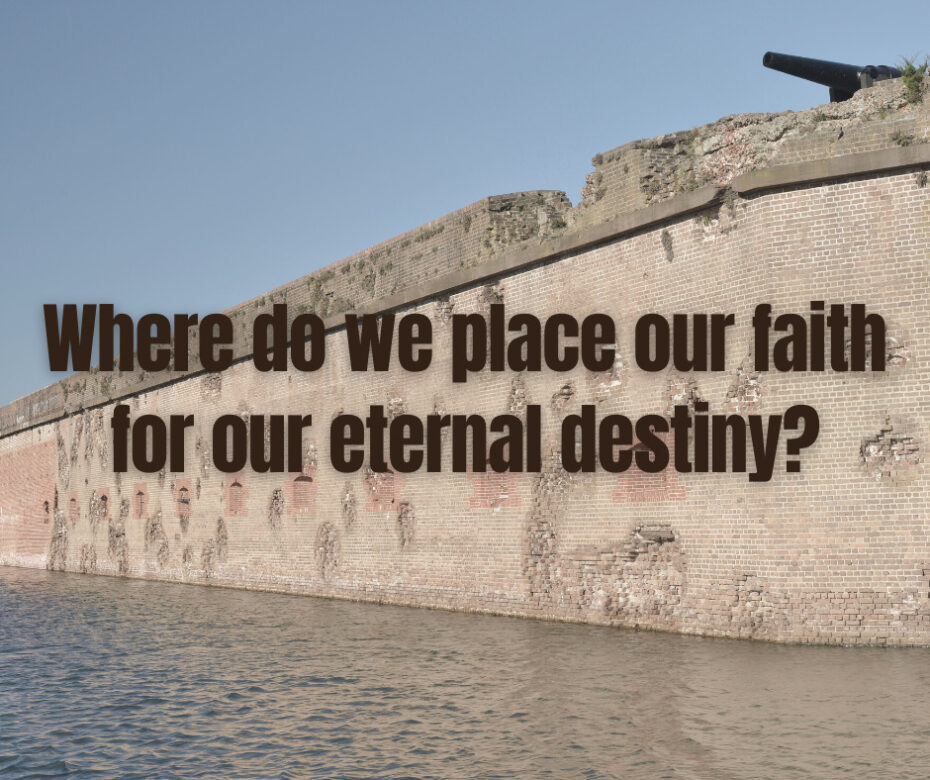Recently, I visited the national park at Ft. Pulaski near Savannah, GA. I didn’t even know it existed until I drove by it. Much of the original fort is still there. The famous Robert E. Lee himself was involved in the fort’s initial plans. At the beginning of the Civil War, it was a stronghold for the Confederacy. Its walls were 11 feet thick. Many of its rooms were underground. The waterways it protected around Savannah were a couple of miles away. The fort was filled with slits in the walls to fire cannons at any ship that dared to approach that part of the Confederacy. The fort was impregnable, and its commander commented that a naval force would have as much success shelling the Rocky Mountains as it would trying to defeat Ft. Pulaski. No doubt, the soldiers inside its immense walls felt secure.
They were wrong. The Union forces approached the fort at the beginning of the Civil War. The cannons on their ships had new technology that provided them with greater accuracy as well as greater distances. Previously, the soldiers in Ft. Pulaski looked at the distant waters with nothing to fear. But reality set in.
Within a few hours, the Union naval forces had continuously pounded one part of the wall around the fort to the point that it was only a few inches thick. One round then landed on the opposite end of the fort, right next to a large room. This large room was where the gun powder for the whole fort was stored. It was thought that the reach of the Union cannons could never touch that part of the fort. If that room exploded, the whole fort would be destroyed, along with the people in it. Faced with this inevitability and the crumbling walls, the commander of Ft. Pulaski quickly raised the flag of surrender, and the Union forces took over the fort.
History, of course, is full of stories in which mankind felt secure in what they had built or done. The people in Jericho were sure they were safe inside their walls when the people of Israel marched around it for seven days (Joshua 6:1-21). Those on the Titanic did not see any way that ship could ever sink.
The Psalmist comments on this attitude by men. He speaks of a king who thinks he is secure because of the size of his army. A mighty man might have a tendency to rely on his own strength. These things, however, are vain. One must place his hope of deliverance on the power of God (Ps 33:16-21).
This same human thinking is also found when it comes to one’s eternal destiny. The world is full of people who feel that what they have done is enough to secure that destiny. Life with God in the future is obtained by hard work in almost every religion, including most versions of Christianity (cf. Matt 7:21-23). Their adherents believe their good works will earn them entrance into God’s kingdom. Many, for example, will maintain that they think they will be in that kingdom because they have kept the Ten Commandments. When it comes to their eternal security, their good works are like the walls around Ft. Pulaski. They wrongly think that nothing can threaten them inside those walls.
In Revelation 20, John records the day when those “walls” will be put to the test, to see if they will stand. He writes about how the unbelievers of all time will stand before Christ, and the books that list all their works will be opened. “And the dead were judged according to their works, by the things which were written in the books” (Rev 20:12). I can imagine that there will be many who will be glad to look to the thick walls of their works for security.
But John says that every one of these individuals will fall short. Every one of those walls will crumble. The results, just like at Ft. Pulaski, will be tragic.
John says that they all had placed their faith in the wrong object. The reason they will not be in the kingdom of God is because their names had not been written in the Book of Life (Rev 20:15). The names of people are written in the Book of Life when they believe in Jesus for eternal life (John 3:16). Instead of relying on their good works, the unbelievers at the Great White Throne Judgment should have believed in Jesus for the promise of everlasting life.
All of us have at times placed our confidence in things that failed us. Sometimes the consequences were not that bad. But sometimes they were. The ramifications of having faith in the walls around Ft. Pulaski proved to be catastrophic for the Confederacy. Faith in one’s good works for eternal life will be even more disastrous for those who believe in them instead of in the promise of everlasting life that the Lord Jesus guarantees to all who believe in Him.


